“Our supermarket is the bush. What chances do my people have of surviving?” asks Thaddeus Chedau, woefully. The former hunter is dismayed by the restrictions placed by the Namibian authorities on access to the natural resources in the Bwabwata National Park, established in 2007. The 59-year-old man walks in the stifling heat of the Zambezi Region, in north-eastern Namibia, his senses on full alert. He is a member of the Khwe ethnic group, which has been present in the far reaches of southern Africa for more than 40,000 years. “We are the first settlers,” he protests, whilst scouting for the slightest track in the sand. “And now we have been deprived of the right to hunt and to gather plants on our ancestral lands.”
On this July morning, in 2017, he is giving a tracking lesson to two teenage boys from the village. By passing on his know-how to the younger generations, Thaddeus Chedau is waging a battle. Former nomads and now sedentary hunter-gatherers, deprived of their land rights and traditional means of subsistence, the 6,000 Khwes living in the park are politically and socially alienated. They are part of the San people, also known by the derogatory term ‘bushmen’.
Their life was disrupted at the end of the 18th century by the arrival of the Mbukushu people, a Bantu ethnic group, to the region. The Mbukushus gradually gained significant political influence. In the late 19th century, what was then South West Africa endured several decades of German colonisation [Editor’s note: which is most infamous for the genocide of 1904-1908 which saw the murder of as many as 100,000 various indigenous peoples – most specifically the Herero and Nama peoples, but an unidentified number of various San peoples were also killed]. Successive Namibian governments have regarded the Khwes with suspicion ever since they allied, more or less under pressure, with the former occupying power, South Africa. In 1990, during the Namibian War of Independence, what was then known as the Caprivi Strip (now the Zambezi Region), a strategic strip of land between Angola and Botswana, was taken over by Pretoria’s defence forces.
Renowned for their knowledge of the terrain, the Khwes were recruited as trackers. This legacy has undermined their attempts to integrate within society. The Khwes, who speak a Khoisan language, with click consonants, and often fail to master the Bantu language of the Mbukushus, find themselves excluded from the labour market and public schools. “We want to be treated like other national groups, and want our children to have the right to think in their mother tongue,” says the former hunter.
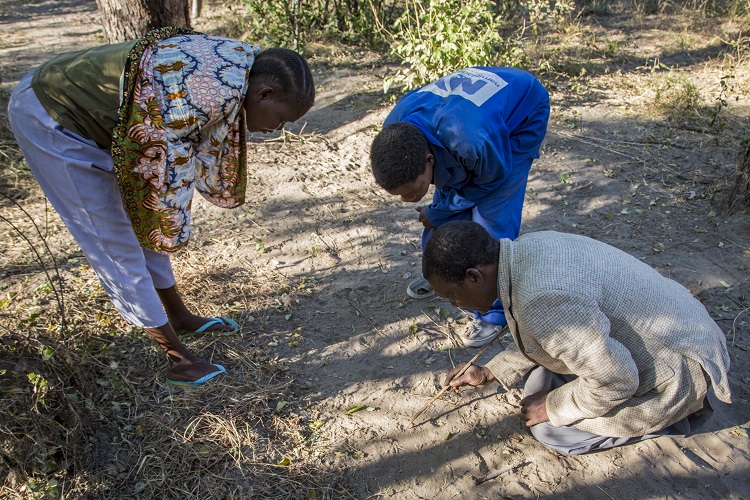
On this morning in June 2017, Thaddeus Chedau took out his teacher’s jacket and gave a tracking lesson to young people in his village. His parents were still able to hunt in the Bwabwata National Park. Today, the Khwes no longer have this right, but he considers the transmission of ancestral knowledge to be paramount.
The villages along the B8 highway reveal the extreme poverty in which the Khwes live. In the name of nature conservation, traditional hunting has been banned and gathering is severely restricted. The Ministry of Environment and Tourism, working in partnership with the Namibian NGO IDRNC, is trying to reduce this poverty by implementing the Community Based Natural Resource Management (CBNRM) programme in the country, delegating the management and use of the fauna and flora to local communities.
On paper, the aims are ambitious. The idea is that new sources of income be developed and secured through tourism, the harvesting of a medicinal plant called devil’s claw and trophy hunting, which is still allowed. In 2006, the Ministry granted Kyaramacan, the multi-ethnic association representing all the inhabitants of the park, two hunting concessions and another for the development of tourist infrastructure.
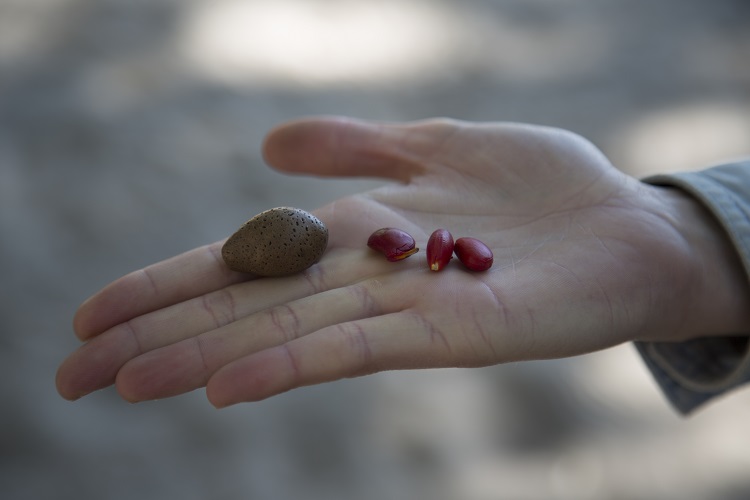
The flora of the Bwabwata National Park includes medicinal plants, such as devil’s claw (harpagophytum procumbens), which helps to treat arthritis. The Khwes are no longer allowed to practise subsistence gathering in the protected areas of the park, but the Namibian government allows them to market devil’s claw through the Kyaramacan association, to develop new sources of income.
The N//goabaca campsite, on the banks of the Popa Falls of the Okavango River, is surviving as best it can: the four spaces for pitching tents are rarely filled, due to the lack of publicity in guidebooks. The lodge hotel, promised years ago, has not yet got off the ground. Trophy hunting, the management of which Kyaramacan delegates to private operators, is the reserve of the wealthiest tourists who are able to pay tens of thousands of euros for the momentary thrill of shooting an elephant. The meat is then shared among the local population.
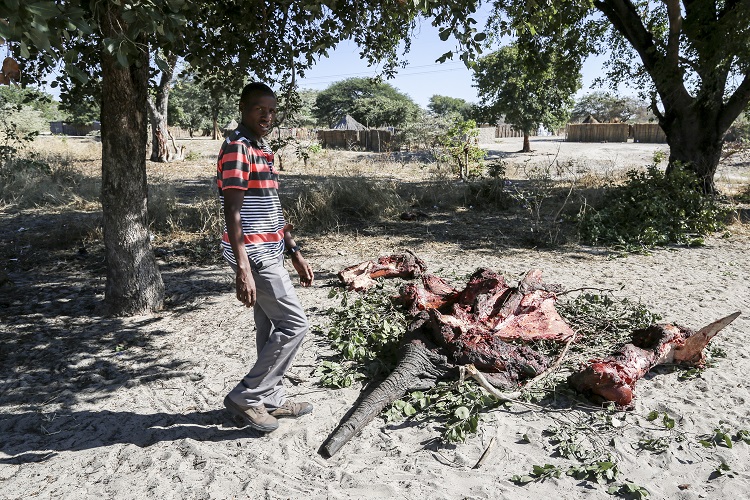
Sunday, 11 June 2017. An elephant was killed the previous day by a European tourist as part of a trophy hunt around Omega 1, a former military base and one of the main Khwe villages in the Zambezi Region. Each year, about 30 tons of meat are shared among members of the local community.
These activities have so far created 43 jobs in the community, a result that fails to impress Chedau: “Each family earns just €13 a year.” Friedrich “Fidi” Alpers, a Namibian of German origin who works for the IRDNC, admits that the situation is far from ideal. “Inventing a new way of life is a major challenge,” insists the enthusiast, who has been living in the bush, in the heart of Bwabwata Park, for the past twelve years. If you exclude a people from an ecosystem to which they have always belonged, they become a threat.”
Frightened by the slow death of their culture, the Khwes feel wounded, says Alpers. “If you are a hunter, and you are forbidden from hunting, you feel angry. It’s not just a matter of putting food on the table, the community’s entire social fabric is affected.” An unwavering supporter of the Khwes, he encourages them to argue their case directly with the government, or abroad.
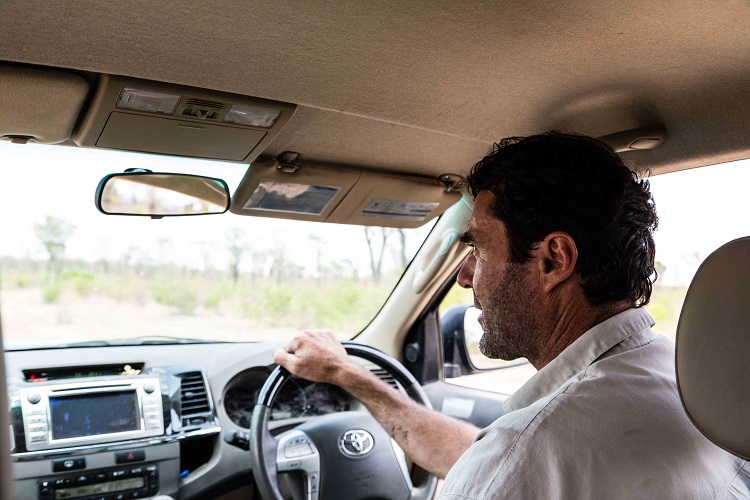
Friedrich Alpers has lived in the heart of Bwabwata Park for 12 years. His credo: indigenous peoples do not reap enough benefit from the preservation of natural resources. “Who benefits from preservation, who benefits from the national parks?” he asks, again and again. “We have to invent new ways of life for these populations, we have to give them access to resources and involve them in the policy-making.”
Alpers was excluded from Bwabwata for several months in 2016, due to his personal engagement, and was finally reinstated on the condition that he strictly abide by the policy laid down by the Ministry. Despite these warnings, he does not intend to give up and is untiring in his insistence that “the wealth of indigenous knowledge must be respected and combined with modern science to manage the Bwabwata. Nature will benefit from it; the Khwes protect it, it’s their livelihood.”
In 2014, during the IUCN World Parks Congress, in Sydney, Chedau called for the “recognition of indigenous knowhow to combat poaching” in the Zambezi Region, which was previously named the Caprivi Strip. Poaching has been on the rise since neighbouring Botswana banned all forms of hunting in 2013. “Most of the members of our community have not gone to school, do not speak English, do not know how to read or write, but have a lot of knowledge about fauna and flora,” he explains. “My school is the bush.” The following year, the park authorities launched a programme to employ Khwe trackers as game wardens.
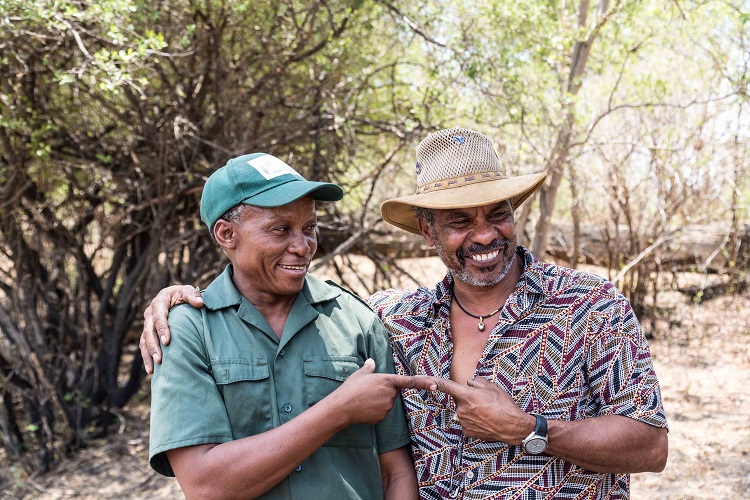
In October 2013, a delegation from the World Indigenous Tourism Alliance (Winta) went to Namibia for the Adventure Travel World Summit. A few members travelled to the Caprivi Strip, where a meeting with the Khwe community was organised. Alfred Chedau (left) has lived his entire life in the Bwabwata Park and is employed by the IRDNC as a “senior facilitator” for the Khwes. That day, an exchange emerged with a representative of the aboriginal people of Australia about the different minority’s customs and the problems they face.
In March 2016, when the European Union was seeking to ban the import of certain hunting trophies, particularly rhino trophies, the ethnic group mobilised to stop the ban. “If hunting stops here, we will die of hunger. It helps us, even if it doesn’t make us fat,” says Thikundja Ndando, a Khwe elder from Chetto village, in a video. The film, produced by Nacso, an association bringing together the NGOs supporting communities in Namibia, is the first episode in a series called “Talking about Hunting”, in which various members of Namibian communities urge the EU to reconsider its position.
Finally, the parties to the CITES Convention (including the EU), which regulates trade in endangered species, recognised at the end of 2016 that trophy hunting is beneficial if it is managed sustainably, and maintained the authorisation of elephant trophies for Botswana, Namibia, Zimbabwe and South Africa.
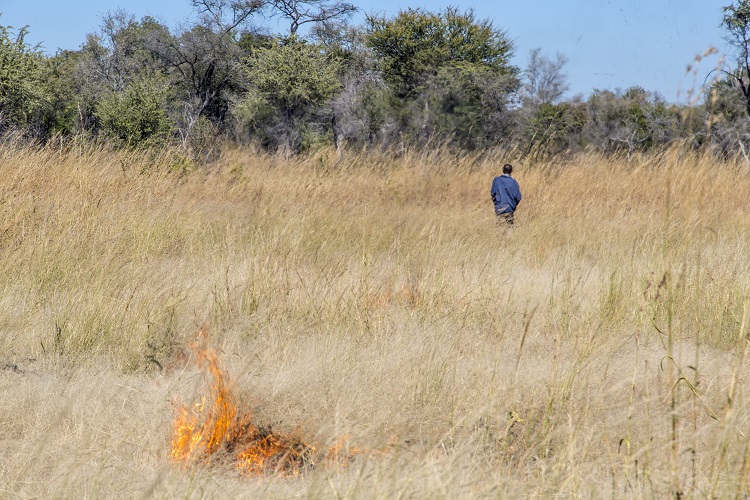
Bushfires are one of the Khwes’ ancestral techniques for regenerating vegetation. Despite being banned in the park, the men continue to light them out of habit, when the soil is still wet, after the rainy season. Friedrich Alpers sees it as an opportunity and encourages them: “This helps to attract animals to the roadside, and that attracts tourists.”
After having helped to set up a cultural village, the IRDNC employee is fighting with the ethnic group to establish a Traditional Environmental Knowledge Outreach Academy, where traditional skills would be passed on. “It will offer courses to anyone who wants to learn about nature,” he explains. “We’re not going to offer gin and tonic safaris!” Chedau wholly agrees: “It is our solution to poverty, to make young people proud of their culture. Our money is our know-how!” He is also calling for the introduction of traditional hunting permits for certain areas of the park. These projects are not, however, appreciated by the authorities, which are turning a deaf ear.












